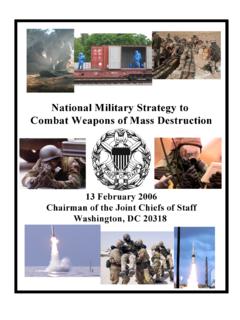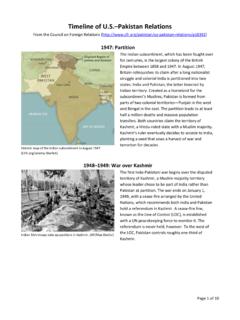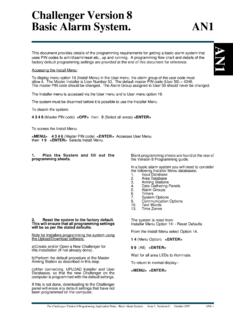Transcription of Constructivism and Security - acsc-nsdm3.regis …
1 Ackerman, John, Barak Carlson and Young Han, Constructivism and Security . Air Command and Staff College (ACSC) Distance Learning Program. Maxwell AFB, AL: ACSC, 2010. Page1 Constructivism and Security By Dr. John T. Ackerman, Lt Col Barak J. Carlson (PhD), and Major Young I. Han Constructivism has become a major theoretical challenger to the dominant international relations paradigms, realism and liberalism (Ba and Hoffmann 2003). The interplay between change in the international system and the behavior of the actors in the system can often be examined and explained using a constructivist lens. In particular, constructivist concepts such as, the power of ideas, the interplay between actors and their social context, the notion that actors words deeds, and interactions shape the kind of world in which they exist, and the world shapes who actors are and what they want (Ba and Hoffmann 2003, 15) have been used to analyze many of the previously unexplainable interactions within international relations.
2 One domain where Constructivism has been most fruitful is international Security relations. The following three case studies offer three examples where realist and liberal explanations of the Security influenced actor actions and interactions are found insufficient or incomplete. The case studies should provide clear, real world examples of the power of ideas, identities, and norms to shape and be shaped by international behavior. The remainder of the text that follows comes from Ba and Hoffmann s work on teaching Constructivism . The material has been modified to meet the needs of this lesson but only superficially. Importantly, the authors have created excellent case studies that will help students understand Constructivism and recognize the differences and similarities between realism, liberalism, and Constructivism . Comprehension of these three major international relations paradigms will enable military professional to make sense of a complex and dynamic international environment.
3 Principles of Constructivism All international relations theories contain ideas about the nature of actors in world politics, the nature of the context that surrounds those actors, and the nature of the interactions between actors. These are necessary assumptions used for explaining why events occur and why actors choose to behave the way they do. Realism, for instance, maintains very clearly that the actors in world politics are power-seeking, Security - conscious states. These states exist in an anarchical context where material resources (guns and money) are the most important characteristics and they interact (mainly) competitively with each other. Liberalism also describes the context of world politics as anarchic, but differs from realism in important ways. Liberals ascribe importance to actors other than states (especially international organizations) and they are less pessimistic about the effects of anarchy they see cooperation being possible when international organizations can help states achieve mutual interests.
4 Ultimately, however, neither realism nor liberalism pays significant attention to ideational factors. To these theories, ideational factors are either insignificant or means to other ends. Constructivism is no different in terms of having ideas about actors, context, and interactions in world politics, but constructivists have very different notions about them and therefore very different explanations for phenomena in world politics. It is because of these different notions that Constructivism can explain changes like those mentioned above. Let us look at actors, context, and interactions in turn (Ba and Hoffmann 2003, 19-20. Actors First, constructivists share with liberals the view that there exist wide ranges of actors who are important players in world politics. They take seriously international organizations, nongovernmental organizations, multinational corporations, and social movements (among others), in addition to states.)
5 Second, constructivists claim that the interests and identities of actors in world politics are malleable; that their interests and identities depend on the context in which they find themselves. This is in significant contrast with realists and liberals who consider that actors have a more or less fixed nature; states always have been and will always be self-interested-- Security -conscious and power hungry according to realists, and rational and concerned with maximizing economic gains for liberals. Constructivists argue that it is better to consider that actors in world politics are dynamic; that the identity and interests of states (and other actors) change across contexts and over time. Who actors are and what actors want is determined by their interactions with other actors and by the larger social context in which they exist. At times some states will be Security -conscious and power-hungry, not because there is something inherent about states that make them this way, but rather because states learn to be this way by interacting with other states within a specific historical context.
6 At other times and in other contexts, interactions can lead states to have different identities, interests, and behaviors. Constructivists argue that states can learn to want things other than power and economic efficiency--state interests can change. States today seem to have an interest in supporting human rights, where they did not have this interest 100 years ago. States can learn to act in ways other than competitively--state behavior can change. In Europe, states that were fighting bloody wars 60 years ago have now joined in a cooperative union. States can even learn to be different--state identity can change. The US today is very different from the US 100 years ago. According to constructivists, these changes are at least partly shaped by the social context in which actors exist and the interactions they have with other actors (Ba and Hoffman 2003, 20). Context Constructivists claim it is impossible to describe the nature of actors independently from a particular historical context.
7 But what characteristics define this context? Like traditional approaches, constructivists assume that the international context in which actors find themselves is anarchical, but they subscribe to a very circumscribed definition of anarchy. For constructivists, anarchy simply means there is no overarching authority in world politics that can make and enforce rules. Unlike traditional approaches, constructivists do not claim that anarchy has an inherent logic of suspicion and competition. In addition, where traditional approaches focus on the material characteristics of the international context--the distribution of guns and money--constructivists emphasize the social character of international life. They claim that the important aspects of the international system are its societal and ideational characteristics--ideas, rules, institutions, and meanings.
8 Actors do not just look around at the material capabilities of their neighbors nor do they simply perform cost/benefit analysis when deciding what their behavior is going to be. Instead, actors are also influenced by their social context-- shared rules, meanings, and ideas. Notions of what is right or wrong, feasible or infeasible, indeed possible or impossible are all a part of an actor s social context, and it is these ideas that shape what actors want, who actors are, and how actors The context of world politics is malleable. The ideas and meanings that shape actors are not static but instead change over time as actors change over time because it is the very behavior and interactions of actors that creates the ideational context of world politics. Sovereignty provides an excellent example. The rules that make up sovereignty form a crucial part of the international context in which world politics takes place.
9 These rules shape who some actors are (states are in part defined by being sovereign), they shape some of what states want (sovereignty gives states an interest in protecting their borders), and they shape how states behave (states create customs offices, diplomatic protocols, immigration policies, and have other policies because of sovereignty).Thus sovereignty, as a set of ideas about how to organize world politics, shapes actors. But sovereignty itself has and continues to change as history unfolds--the rules of sovereignty have undergone numerous changes ( , from absolute sovereignty to popular sovereignty) and they continue to evolve today (according to some, globalization and humanitarian interventions have begun to erode the power of the rules of sovereignty).2 These changes occur through the actions and interactions of actors (Ba and Hoffmann 2003, 20-21). Actions and Interactions So now we come full circle with constructivist thought.
10 Actors shape their own social context and the social context in turn shapes the actors (interests, identities, and behaviors) themselves. It is this cycle that is the core notion of Constructivism . The actions and interactions of the actors keep the cycle moving. Let us return to the sovereignty example. Sovereignty is a set of rules that tells state actors how to interact with one another--the rules shape actors identities, interests, and behaviors. But the power of these rules (indeed the very existence of the rules) depends on actors acting and interacting in accordance with them. If states stop acting as though borders are inviolate, some of the rules of sovereignty will cease to have power and may cease to exist. Actors create their own common understandings--their social context--through their actions and interactions. Human rights provide another example. There is no central authority that has decreed that states should protect human rights, but the idea that it is right to protect them has come to shape the interests and behavior of many states.


















